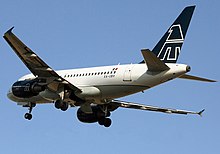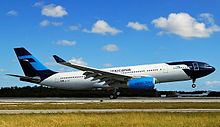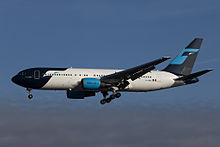Mexicana de Aviación
| Mexicana de Aviación | |
|---|---|

|
|
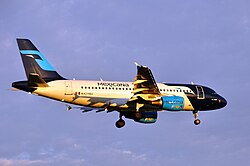
|
|
| IATA code : | MX |
| ICAO code : | MXA |
| Call sign : | MEXICANA |
| Founding: | 1921 |
| Operation stopped: | 2010 |
| Seat: |
Mexico City , Mexico |
| Turnstile : | |
| Home airport : | Mexico City Benito Juarez |
| Management: | Manuel Borja Chico ( CEO ) |
| Alliance : |
oneworld to 2004 Star Alliance |
| Frequent Flyer Program : | Mexicana Go |
| Fleet size: | 64 |
| Aims: | National and international |
| Mexicana de Aviación ceased operations in 2010. The information in italics refer to the last status before the end of operation. | |

The Compañia Mexicana de Aviación, SA de CV , in its external appearance Mexicana for short , was a Mexican airline based in Mexico City . It was the first airline in the country and the second largest airline in Mexico after Aeroméxico , and the fourth oldest airline in the world after KLM , Avianca and Qantas .
In August 2010, the company filed for bankruptcy or bankruptcy protection , but wanted to maintain air traffic with the exception of long-haul flights. On August 28, 2010, however, all flights were suspended until further notice. Operations did not resume until the end of 2012. In April 2014, the resolution was finally initiated after rescue attempts appeared hopeless.
history
First years
Mexicana was founded in 1921 as Compañía Mexicana de Transportación Aérea, SA (CMTA) by LA Winship and Harry J. Lawson . The first flight was from Mexico City to Tampico. In 1924 the company was bought by the Compañia Mexicana de Aviación , run by William Mallory and George Rihl , and the current name was introduced on August 20, 1924 . Pan American Airways bought the line in 1929, but gave it up after bankruptcy in 1968 .
In the 1930s, the route network was continuously expanded and the service improved. Mexicana was the first foreign airline to fly to Los Angeles on January 3, 1936.
The jet age
In the early 1960s, Mexicana flew four de Havilland Comets. The first jet-powered flight took place on July 4, 1960 from Mexico City to Los Angeles. Mexicana went bankrupt in the late 1960s. In the meantime, the Boeing 727 was introduced in 1966 . After Crescencio Ballesteros took over the management as Chairman and Manuel Sosa de la Vega on January 15, 1968, the strategic plans were changed and the economic problems were overcome in a short time.
In the 1970s the fleet increased to 19 jets, making it the largest jet-powered fleet in Latin America. A Boeing 727 simulator was operated in Mexico City. At the time, Mexicana owned the largest Boeing 727 fleet outside the United States.
On July 15, 1982, the Mexican government became the largest shareholder with a stake of 58%. In 1984 Mexicana moved into the new headquarters in Mexico City. In 1988, the main competitor Aeronaves de México (Aeroméxico) filed for bankruptcy and Mexicana took over some of the long haul routes, including flights to Canada and South America.
Mexicana as part of CINTRA
In the early 1990s, Mexico's aviation industry was deregulated and several new airlines were formed in Mexico. Mexicana then modernized its fleet from 1991 with Airbus A320 planes and additionally from 1992 with Fokker 100. Aeroméxico, which was reorganized in 1993, grew again and brought Mexicana to the brink of ruin.
In the mid-1990s, all Mexican airlines suffered from the sharp devaluation of the Mexican peso and Mexicana, Aeroméxico and their affiliated regional airlines were merged under the umbrella of the national company CINTRA ( Corporación Internacional de Transporte Aereo ) and taken over by the state. In 1995 the total merger of Mexicana and Aeroméxico took place as part of CINTRA. Mexicana grew continuously under the umbrella of CINTRA and became a member of the Star Alliance in 2000 , but resigned in March 2004 due to disputes over traffic rights with United Airlines .
New independence in the 2000s

In 2003 the last Boeing 727s were decommissioned and replaced by new Airbus A318, A319 and A320. Only the long-haul flights were still flown with Boeing 767s. 2005 was a decisive year for Mexicana as the company and Aeroméxico were privatized. Both companies got their independence back. At the same time, several low-cost airlines were founded in Mexico. Mexicana responded by founding its own low-cost airline called AeroCaribe , later " Click Mexicana ". On November 29, 2005, Mexicana and its subsidiary were sold by CINTRA to the Mexican hotel chain Grupo Posadas . "Click Mexicana" was renamed " MexicanaClick " and transformed into a regional airline.
Mexicana also continued to work with some members of the Star Alliance , Aeroméxico and Avianca , but joined the oneworld Alliance on November 10, 2009 .
Bankruptcy and restructuring attempts
On August 3, 2010, Mexicana filed for bankruptcy in both Mexico and the United States after American and Canadian leasing companies had withdrawn aircraft. In the insolvency proceedings, the company is to be restructured and reorganized, whereby the flight plan is to be maintained, with a few exceptions in the long-haul area. The subsidiary MexicanaClick is not affected by the bankruptcy. On the evening of August 4th, ticket sales were temporarily suspended, but flights that have already been booked are to be operated. On August 9, it was announced that international connections would be suspended for the time being.
On August 23, it was announced that a 95 percent stake in Mexicana will be acquired by the Mexican consortium Tenedora K , while the remaining 5 percent will go to a pilots union.
Contrary to previous announcements, on August 27, 2010 Mexicana suspended all flight operations for the time being due to the current financial situation and a halting restructuring process. The new owners Tenedora K declared a need for further investors to rescue the insolvent company.
In November 2010, another new investor, PC Capital, was presented who announced that it would gradually restart operations in December 2010 with reduced supply and capacities. The airline initially planned to sell flight tickets again from January 31, 2011 and soon to fly to eleven destinations with six aircraft (plus one as a reserve). However, this could not be met. On February 14, a test flight was carried out with officials from the Mexican and US aviation authorities to San Antonio , Texas , in order to officially fly again. On March 2, 2011, however, it was announced that the sale and restructuring of the company was initially on hold due to unclear financing from new investors. As of August 2011, the company has still not resumed operations, the further development is still unclear. According to the latest plans from November 2011, operations should initially only be resumed with charter flights .
As of March 2013, however, the company has still not operated any more flights.
In April 2014, more than three years after the cessation of operations, the Mexican federal court declared Mexicana that it could not be reorganized and finally initiated the process.
aims
Mexicana operated a national and international route network from its home base Aeropuerto Internacional Benito Juárez in Mexico City .
fleet
Fleet at the end of operations
When flight operations were discontinued in August 2010, the Mexicana fleet consisted of 65 aircraft with an average age of 11.1 years.
- 10 Airbus A318-100 (taken over by Avianca )
- 24 Airbus A319-100
- 25 Airbus A320-200
- 2 Airbus A330-200
- 2 Boeing 767-200
- 2 Boeing 767-300ER
As of August 2011, there were no more aircraft registered on Mexicana.
Previously deployed aircraft
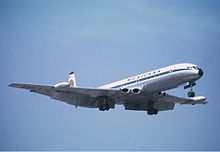
Before that, Aeroméxico also operated aircraft of the following types:
- Avro Anson
- Boeing 247
- Boeing 727
- Boeing 757
- Cessna T-50
- De Havilland Comet 4
- De Havilland Comet 4C
- Douglas DC-2 (C-39)
- Douglas DC-3
- Douglas DC-4
- Douglas DC-6
- Douglas DC-6B
- Douglas DC-7C
- Douglas DC-8-71 (rented)
- Fairchild 71
- Fairchild C-82
- Fokker 100
- Lockheed 9 Orion
- Lockheed Model 10 Electra
- McDonnell Douglas DC-10, -15
Incidents
Mexicana has had a total of 20 total aircraft losses since 1936, including 10 with 388 fatalities. Examples:
- On August 11, 1945, a Mexicana Douglas DC-2-243 ( aircraft registration XA-DOT ) had an accident at the Iztaccíhuatl volcano in bad weather . All 16 people on board were killed, 4 crew members and 12 passengers (according to another source 4 + 11, a total of 15).
- On September 1, 1951, a Mexicana Douglas DC-6 (registration XA-JOR ) coming from Los Angeles landed in an almost drained lake while approaching Mexico City Airport . All four crew members and 38 passengers survived the crash landing. The plane was beyond repair.
- On June 4, 1969 was Boeing 727-64 Mexicana (XA-SEL) on approach to the airport Monterrey km northwest flown 23 of them against a mountain (CFIT, controlled flight into terrain ). All 79 people on board were killed.
- On September 21, 1969, a Mexicana Boeing 727-64 (XA-SEJ) hit 1,500 m from the runway at Mexico City Airport , jumped back up and collided with a railway embankment . The aircraft was in the correct landing configuration. The cause could not be clarified because the flight data recorder had not been working for days and the voice recorder had already been expanded. Of the 118 inmates, 27 were killed.
- On October 20, 1973, a Mexicana Boeing 727-14 (XA-SEN) landed in a field 2 kilometers east of the destination airport Mazatlán . The machine came to a standstill with the landing gear torn off and was irreparably damaged. All 123 occupants survived the accident.
- On March 31, 1986, the worst accident to date occurred in Mexico with a Boeing 727. A Boeing 727-264 of Mexicana (XA-MEM) fell out of control from a height of almost 10,000 meters on the flight from Mexico City Airport to Puerto Vallarta the mountains near Las Mesas after an overheated tire filled with air instead of nitrogen burst in mid-flight, causing a fire, hydraulic failure and other damage. The triggers were maintenance errors on the chassis. All 167 occupants died (see also Mexicana flight 940 ) .
See also
Web links
- Website of Mexicana de Aviación (Spanish, English)
Individual evidence
- ↑ a b Mexicana is a member of the aviation alliance oneworld aero.de (November 10, 2009)
- ↑ a b Mexicana files for bankruptcy . airliners.de, August 4, 2010.
- ↑ a b Grupo Mexicana suspends flights until further notice . ( Memento of August 30, 2010 in the Internet Archive ) mexicanainforma.com (English, Spanish) accessed on August 28, 2010.
- ↑ a b aero.de - Final end for Mexico's oldest airline April 5, 2014.
- ↑ Mexicana stops ticket sales . airliners.de, August 5, 2010.
- ↑ Mexicana cancels international flights . airliners.de, August 9, 2010.
- ↑ New investors save Mexicana . airliners.de, 23 August 2010.
- ↑ Affected Mexicana suspends flights aero.de, August 28, 2010.
- ↑ Mexicana wants to take off again . November 12, 2010.
- ↑ Anthony Harrup: Mexicana Airline To Resume Flights 'Soon' With Seven Planes . In: Wall Street Journal . January 24, 2011, accessed January 24, 2011.
- ↑ Darren Shannon: Mexicana Plans Feb. 14 Return To Service , January 26, 2011, accessed January 27, 2011.
- ↑ Mexicana realiza vuelo de aprobación con autoridades de México y EE.UU. Info-Transportes Online, February 15, 2011, accessed February 19, 2011.
- ↑ Bid to revive Mexicana falls apart usatoday.com (English) March 2, 2011.
- ↑ uk.finance.yahoo.com - Grounded Mexicana to offer charter flights ( Memento of October 17, 2011 in the Internet Archive ) (English) October 8, 2011.
- ↑ a b Fleet of the Mexicana de Aviación ( Memento from September 30, 2007 in the Internet Archive ) ch-aviation.ch (English) accessed on August 27, 2010.
- ↑ Fleet age of Mexicana airfleets.net (English) accessed on August 10, 2010.
- ↑ GECAS leases ex-Mexicana A318s to Avianca flightglobal.com, November 30, 2010.
- ^ REG Davies: Airlines of Latin America since 1919. Putnam Aeronautical Books, London 1997, ISBN 0-85177-889-5 , pp. 639-642.
- ↑ Ed Coates' Civil Aircraft Photograph Collection, X-ABCI, Fairchild FC 71, 5508 (c / n unknown)
- ^ Accident statistics Mexicana , Aviation Safety Network (English), accessed on August 14, 2016.
- ↑ Air-Britain Archive: Casualty compendium part 42 (English), September 191, p. 82.
- ^ Accident report DC-2 XA-DOT , Aviation Safety Network (English), accessed on November 24, 2017.
- ^ Accident report DC-6 XA-JOR , Aviation Safety Network (English), accessed on August 27, 2017.
- ^ Accident report B-727-100 XA-SEL , Aviation Safety Network (English), accessed on February 5, 2019.
- ^ Accident report B-727-100 XA-SEJ , Aviation Safety Network (English), accessed on February 5, 2019.
- ↑ Accident report B-727-100 XA-SEN , Aviation Safety Network (English), accessed on February 25, 2019.
- ↑ Accident report B-727-200 XA-MEM , Aviation Safety Network (English), accessed on February 3, 2019.


